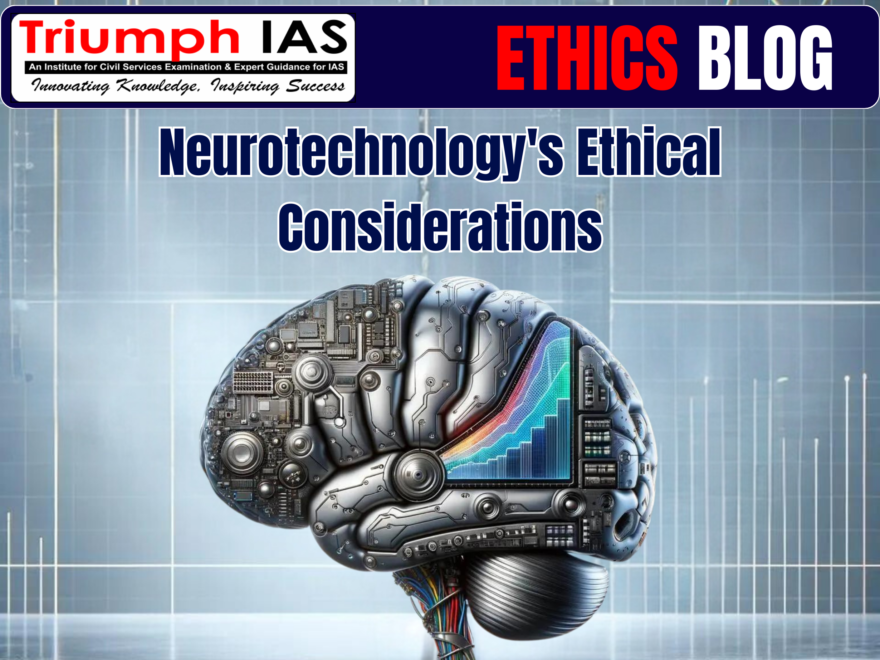
Neurotechnology’s Ethical Considerations
[Relevant for Public Ethics, Integrity and Aptitude]
About Neurotechnology
Neurotechnology is defined as the assembly of methods and instruments that enable a direct connection of technical components with the nervous system. These technical components are electrodes, computers, or intelligent prostheses.
They are meant to either record signals from the brain and “translate” them into technical control commands, or to manipulate brain activity by applying electrical or optical stimuli.
Neurotechnology encompasses all technologies developed to understand the brain, visualise its processes and even control, repair or improve its functions.
As the field of neurotechnology continues to advance, it is crucial to address the ethical implications that come with it. Neurotechnology, which encompasses the development and application of technologies that interact with the nervous system, has the potential to revolutionize various aspects of our lives, from healthcare to entertainment. However, with great power comes great responsibility, and it is essential to consider the ethical ramifications of these technologies.
Privacy and Consent
One of the primary concerns surrounding neurotechnology is the issue of privacy and consent. As these technologies become more sophisticated, they have the ability to access and manipulate sensitive information about an individual’s brain activity, thoughts, and emotions. It is crucial to establish clear guidelines and regulations to ensure that individuals’ privacy rights are protected and that informed consent is obtained before any neurotechnological interventions are performed.
Equality and Access
Another important consideration is the issue of equality and access to neurotechnological advancements. As with any new technology, there is a risk that it may be available only to those who can afford it, leading to a widening of the gap between the haves and the have-nots. It is essential to ensure that neurotechnological advancements are accessible to all, regardless of socioeconomic status, and that their benefits are distributed equitably.
Cognitive Liberty and Identity
The use of neurotechnology also raises questions about cognitive liberty and personal identity. As these technologies become more advanced, they may have the ability to alter an individual’s thoughts, emotions, and even personality. It is crucial to consider the implications of this and to ensure that individuals’ right to cognitive liberty is protected and that they are not coerced into undergoing neurotechnological interventions that may alter their identity against their will.
Dual-Use and Military Applications
Another ethical concern is the potential for neurotechnology to be used for military and dual-use applications. As these technologies become more advanced, they may have the potential to be used for purposes such as mind control, interrogation, and even the development of “super soldiers.” It is essential to establish clear guidelines and regulations to ensure that neurotechnology is not misused for these purposes and that its development is guided by ethical principles.
Conclusion
In conclusion, as the field of neurotechnology continues to advance, it is essential to address the ethical implications that come with it. By considering issues such as privacy, consent, equality, access, cognitive liberty, identity, and dual-use applications, we can ensure that the development and application of neurotechnology is guided by ethical principles and that its benefits are distributed equitably. It is up to us, as a society, to ensure that neurotechnology is used in a way that respects and protects the rights and well-being of all individuals.
|
What is UNESCO? About: UNESCO is a specialised agency of the United Nations (UN). It seeks to build peace through international cooperation in Education, the Sciences and Culture. Members:
Objectives:
|
(Reference: Static portion)
Frequently Asked Questions:
1. What are the main ethical concerns with neurotechnology?
The main ethical concerns with neurotechnology include privacy issues (accessing sensitive brain data), informed consent, cognitive liberty (altering thoughts/emotions), identity changes, and potential for misuse (e.g. mind control, surveillance). There are also concerns about equitable access to these technologies.
2. How can we ensure privacy and data protection with neurotechnology?
To protect privacy, clear guidelines and regulations are needed to govern the collection, storage and use of neurological data. Robust security measures, data anonymization, and giving individuals control over their data can help. Transparency and informed consent from participants is critical.
3. What role should governments play in regulating neurotechnology?
Governments need to establish clear legal and regulatory frameworks for neurotechnology. This includes guidelines for clinical trials, data protection laws, and oversight mechanisms. International collaboration is important to develop harmonized regulations. Governments should also invest in research on the societal impacts.
4. How can we ensure equitable access to neurotechnological treatments?
Strategies to promote equity include public funding for research, price controls, and incentives for companies to serve underserved populations. Regulatory approval processes should consider access and affordability. Partnerships between public and private sectors can help expand reach.
5. What are some potential benefits of neurotechnology that make it worth pursuing?
Neurotechnology holds promise for treating neurological disorders, restoring sensory/motor functions, enhancing cognition, and expanding human potential. It could lead to breakthroughs in understanding the brain and consciousness. Responsibly developed, it could dramatically improve quality of life for many.
6. How can we ensure neurotechnology is developed ethically?
Key elements are multistakeholder collaboration, public engagement, and integrating ethics into every stage of research and development. Establishing independent ethics review boards, promoting diversity in the field, and having strong accountability measures are important. Ongoing monitoring and adjustment of ethical frameworks is needed as the technology evolves.
Related Blogs …
 |
 |
Follow us :



Find More Blogs…
| Compare and contrast Karl Marx’s and Max weber’s | Karl Marx- Historical Materialism |
| Position of Women In the Modern Indian Society | Sociology: Social system and pattern variables |

